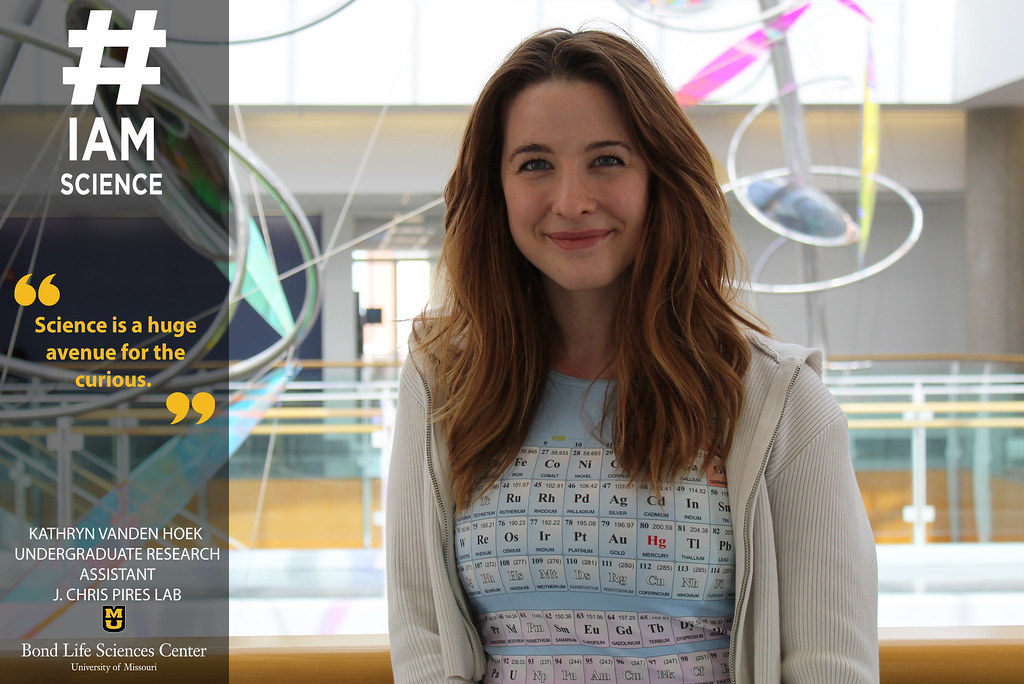Published on
By Karly Balslew | Bond LSC
Kathryn Vanden Hoek proves that it is never too early to dive into research if you have a passion for it.
The undergraduate research assistant started hands-on research her freshman year through the Freshman Research in Plants Programs (FRIPS). This program introduces new students to plant research and exposes them to a lab setting. She matched with the Chris Pires lab at Bond LSC in January of 2021.
“I absolutely love it,” Vanden Hoek said. “I knew for a long time that I wanted to do research, so I wanted to start as soon as I possibly could and I’m really glad that I did.”
Now a sophomore, Vanden Hoek joined the BioInformatics in Plants program (BIPS) where she paired up with a computer science student to work in the lab. Her partner focuses on the coding side of a project while Vanden Hoek sticks with working directly with plants.
She uses phytoremediation on cakile maritima plants. Also known as the European sea rocket, this sprawling species can be found growing on sandy beaches along coastlines in Europe. Cakile maritima are typically used to learn about plant reactions. In the lab, she uses the plant to extract pollutants out of the soil. Vanden Hoek studies the genes of the plant and how it can withstand certain pollutants, which could be applied to other species in the future.
“There are so many amazing things that you can do with plants,” Vanden Hoek said. “They are so intricate and complex, but we can take advantage of that and learn more about how they work.”
A typical day for her starts with classes before coming to Bond LSC. Here she collaborates with graduate student Shawn Thomas to conduct the hands-on portion of their experiments. Thomas is also part of the Pires lab but both students collaborate with the Mendoza lab frequently as well. Vanden Hoek runs various protocols, works in the sterilization hood frequently, and goes over posters for upcoming conferences.
Her goal is to work on solutions for climate change, a cause she is extremely passionate about. For her, interacting and questioning the natural world has always played a large role in her life.
“My grandma once said when I was a little kid, ‘I have never seen a kid who loves playing in the dirt so much,’” Vanden Hoek jokes. “My sister was the Barbies and fashion girl, my brother was the video games boy and I was outside digging in the dirt and playing with flowers all the time.”
Her parents are both in the medical field, which originally encouraged her to become a doctor. She constantly immersed herself in the medical world, so it made sense to her to go down that path. However, a senior project in her high school calculus class quickly changed her mind.
“I was giving the presentation in class and talking about possible solutions with everyone, and there was just this spark inside of me,” she said.
Her project covered climate change and from there she combined her love for science, plants, and the environment. Pursuing this field has also helped her through the pandemic and to overcome other obstacles.
“I am a huge introvert,” Vanden Hoek confesses. “My freshman year I struggled a lot, especially with COVID and I preferred individual projects because I wanted to just get my research done by myself. But through the programs and classes I’ve been in, I understand that it’s a lot nicer to have other people to lean on and have others’ perspectives on the research.”
She explains that she has gained a deeper sense of understanding for others in her research area from the interactions she has had at Bond LSC. When she isn’t in the lab, she loves to explore the world of fashion design.
“I think if I didn’t have this drive to make a difference that I would quit and try to become a fashion designer,” Vanden Hoek said.
She loves thinking about new clothing ideas, thrifting, and reworking clothing pieces into new outfits. Taking care of her houseplants, painting, and baking are a few favorite hobbies that allow her to slow down in her everyday life. Yet even in her downtime, she is still a tenacious learner and absorbs as much information as possible.
“My mom always said that I’m relentlessly curious,” she said. “I feel like that’s how a lot of researchers are — they wonder about life and how things work — and science is their avenue to explore that.”
